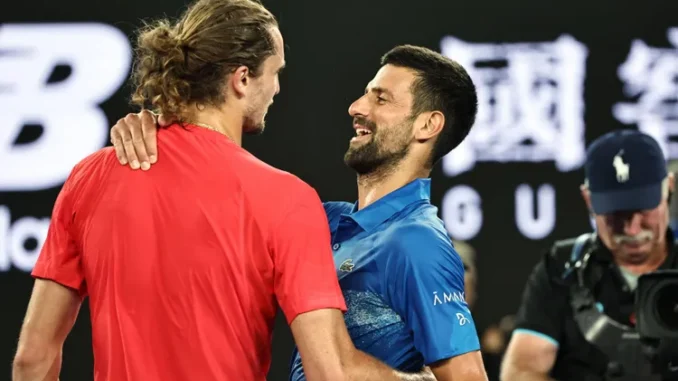
In the hallowed halls of Wimbledon, where the pursuit of tennis glory often overshadows the human stories behind the players, Novak Djokovic, the 24-time Grand Slam champion, has offered a heartfelt gesture of support to Alexander Zverev following the German’s candid revelation about his mental health struggles. After a shocking first-round exit to France’s Arthur Rinderknech on July 1, 2025, Zverev, the world No. 3, laid bare his emotional turmoil, sparking a broader conversation about mental health in the grueling world of professional tennis. Djokovic’s empathy, rooted in his own experiences, underscores the growing recognition of mental well-being as a critical factor in the sport.
Zverev’s defeat, a marathon five-set battle ending 7-6(3), 6-7(8), 6-3, 6-7(5), 6-4, marked his earliest Grand Slam exit since 2019 and came as part of a turbulent 2025 season. Despite a strong start with a runner-up finish at the Australian Open, where he fell to Jannik Sinner, Zverev has struggled to maintain consistency, with disappointing performances in Buenos Aires, Rio de Janeiro, Indian Wells, and Miami. His Wimbledon loss to Rinderknech, a world No. 72 player, was particularly jarring, as Zverev failed to convert any of his nine break point opportunities. In a raw and emotional press conference, he confessed, “I feel very alone out there at times. I struggle mentally. I’ve been saying that since after the Australian Open. I’m trying to find ways to get out of this hole, but I keep finding myself back in it.”
The 28-year-old German, who has reached three Grand Slam finals without securing a title, admitted to feeling “empty” and “lacking joy” both on and off the court. “I’ve never felt this empty before. Just lacking joy in everything that I do,” he said, revealing that even victories in tournaments like Stuttgart and Halle failed to lift his spirits. For the first time, Zverev expressed openness to seeking therapy, stating, “Maybe for the first time in my life, I’ll probably need it. I’ve been through a lot of difficulties in life generally.” His struggles are compounded by off-court challenges, including past allegations of domestic abuse, which he has denied, and the relentless pressure of a demanding tennis schedule.
Djokovic, fresh off his 99th Wimbledon victory against Dan Evans (6-3, 6-2, 6-0), responded with profound empathy during his own press conference. “I understand exactly what he’s going through because I’ve been through that many times where you feel empty or less joy or less happiness playing,” he said, acknowledging the universal nature of such struggles in the high-stakes world of tennis. The Serbian star, known for his mental resilience, emphasized the importance of addressing mental health, a topic he believes “deserves more attention” in the sport. “Sascha and I have a great relationship. I like him a lot as a person. We talk quite a bit about tennis and different topics in life,” Djokovic added, noting their recent discussions about technical aspects of Zverev’s game before Wimbledon. “He knows he can always reach out to me.”
Djokovic’s support is not new; earlier this year, after Zverev’s Australian Open final loss, the two spoke for hours in Shanghai, with Djokovic offering guidance during a particularly low moment following Zverev’s US Open quarterfinal defeat. “I salute the players who have the courage to come out and speak about that,” Djokovic said, praising Zverev’s openness. He suggested that Zverev’s packed 2025 schedule—35 wins and 14 losses across 48 matches—might be contributing to his mental fatigue, advising, “Maybe he needs to take a break and refresh his mind.” This sentiment was echoed by other players, including Aryna Sabalenka, who, drawing from her own five-year experience with therapy, urged Zverev to “open up to whoever is close to him” to avoid letting internal struggles “destroy” him.
The tennis community has rallied around Zverev, with players like Carlos Alcaraz and Amanda Anisimova sharing their own experiences of navigating mental lows. Alcaraz, who admitted to feeling down during tournaments, emphasized the importance of “living in the moment” and finding joy in playing, while Anisimova credited a break from the tour for helping her rediscover her passion. Andrey Rublev, who has battled depression, suggested that tennis is merely a “trigger point” for deeper personal struggles, noting, “It’s something inside of you that you need to face.” These responses highlight a cultural shift in tennis, where players are increasingly vocal about mental health, following the trailblazing example set by Naomi Osaka in 2021.
Zverev’s vulnerability has sparked hope that he will find the support needed to navigate this challenging period. As he prepares for the Nordea Open in Sweden later this month, his openness serves as a powerful reminder of the human toll of professional tennis—a sport that demands not only physical prowess but also mental fortitude. Djokovic’s compassionate outreach, coupled with the broader support from peers, underscores the camaraderie that exists beneath the competition. For Zverev, the path to rediscovering joy may begin with these connections, as the tennis world watches, rooting for his resilience both on and off the court.
Leave a Reply